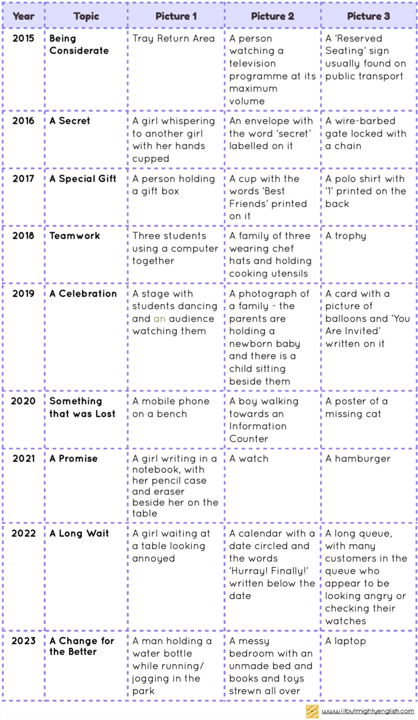2015-2023 Compiled Topics for PSLE Continuous Writing + 3 Tips to Do Well!
TIPS
4/10/20243 min read
2015-2023 Compiled Topics for PSLE Continuous Writing + 3 Tips to Do Well!
Hello everyone! With the PSLE fast approaching, today’s post will focus on the EL Paper 1 Continuous Writing section. Whether you are running out of composition topics to practise or looking for topics to boost your revision, look no further!
Below is a compiled list of PSLE Continuous Writing Topics from 2015 to 2023. In this compiled list, you will find the different topics – and a brief description for each of the accompanying pictures – tested each year starting from 2015, which is the year the new format for composition came out.
Key points to address for 2023 Compo topic: A Change for the Better
To successfully address this topic, it is essential that you mention how the character was before and after the change. It will help the story to flow logically and seamlessly to mention what caused the change to happen.
After which, a well-written piece will also detail what the change was and how it happened. Remember, the more actions and details you show, the clearer it is for the markers to visualise how the change is carried out.
Finally, do not forget the keywords in the topic – “for the better”. You will need to show the positive outcomes of the change, whether it is from the character’s point of view or from the observations of others. This will help to demonstrate how you have a clear focus of and are mindful of the topic!
Bonus: 3 Tips to Do Well For Writing
By now, you should be familiar with the continuous writing format: you are required to produce a composition of at least 150 words and it should be based on one (or more) of the three pictures provided.
Other than being familiar with the format, what else should you take note of in order to do well for this section? Let me share three simple tips with you:
Tip 1: Plan before you write
Before rushing to start your composition, remember to put aside at least 5 minutes to plan out your composition using H.E.T.S.
Although it might seem troublesome to plan at the beginning, it is always better to organise your ideas before executing them. You will find that planning will help your writing to flow beautifully!
Otherwise, you may get stuck while you are writing and spend precious time thinking about how to continue your story instead. This may make you panic, or worse, force you to churn out an ending that is flawed and illogical. As Benjamin Franklin once said, “Failing to plan, is planning to fail.” However, as time is precious, avoid taking more than 10 minutes to plan!
Tip 2: Include TRPs and PRPs
While in the planning stage, you should also jot down a few topic-related phrases (TRPs) to ensure that you stay on the topic. Remember that these phrases should be used throughout the composition so that it helps your story remain closely linked to the topic. Moreover, study the picture that you are going to use carefully and write down picture-related phrases (PRPs) to ensure that the picture is used meaningfully in your composition.
Tip 3: Start with a Bang!
Once you are ready to begin writing, consider which story opening would be the most suitable one for your composition. Remember that the opening should be something that hooks your readers and makes them want to continue reading. Are you aware that there are many interesting ways to start your composition? For instance, you can start by describing the setting or using an unusual sound.
Hashtags
PSLE english compositions Singapore essays secondary O level psle al score psle scoring system psle marking days 2024 al psle psle grading system psle al score for secondary schoolpsle al psle achievement levels psle approved calculator psle aggregate score psle al bandingpsle age psle approved chinese dictionary 2024 psle 2024 cut off point o level 10 year seriesPSLE pyp Psle past year papers PSLE top primary school exam papers PSLE Actual exam papers o level syllabus o level tys o level tuition o level exam date singapore o level exam paper o level examination


